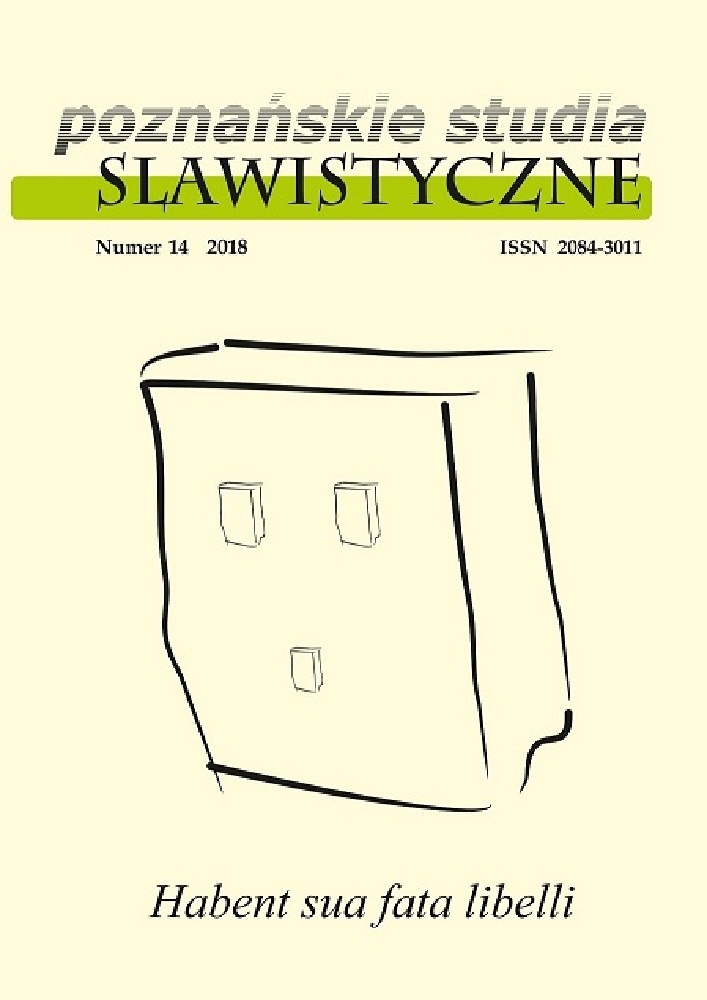Abstract
Scientific work of Professor Halina Janaszek-Ivaničková (1931–2016) can be placed in three postwar periods of Poland’s history, albeit her scientific and organizational work with regard to comparative studies was carried out on a few continents. Her scientific programme, methodological inspirations and message in each of those periods were aimed against regime limitations, but simultaneously pointed to a positive programme suggesting what can be done and what is right. Initially
her programme could be placed with positivistic message and Bakhtin methodology (studies on Stefan Żeromski and Karol Čapek), only for the first lady of Polish comparative studies to become after a breakthrough Revolutions of 1989 a promotor of postmodernism in Poland and other Slavic countries (“From modernism to postmodernism”, 1996). Later she pointed to a “change of paradigm” and foresaw the decline of postmodern formation (“New face of postmodernism”, 2002). With a sharp mind she anticipated a radical “turn to the right” which we are now witnessing. In her last years she was working on a monography on Warsaw Uprising (1 August – 3 October 1944) during which her father, colonel Jan Wacław Janaszek, a soldier of antifascism Home Army, died.
References
Bertens, H. (1997). The Debate on Postmodernism. W: International Postmodernism. Theory and Practice. Red. H. Bertens, D. Fokkema. Amsterdam-Philadelphia: University of Utrecht.
https://doi.org/10.1075/chlel.xi
Bauman, Z. (2000). Globalizacja. I co z tego dla ludzi wynika. Przeł. E. Klekot. Warszawa: Państwowy Instytut Wydawniczy.
Bauman, Z. (2004). Płynna nowoczesność. Przeł. T. Kunz. Kraków: Wydawnictwo Literackie.
Bauman, Z. (2007). Europa – niedokończona przygoda. Przeł. T. Kunz. Kraków: Wydawnictwo Literackie.
Cornis-Pope, M. (1997). Self-Refentiality Postmodernism. Theory and Practice. Red. H. Bertens, D. Fokkema. Amsterdam–Philadelphia.
Čapek, K. (1986). O umění a kultuře. Praha: Československý spisovatel.
Čapek, K. (1956). R.U.R. Przeł. A. Sieczkowski. Warszawa: Państwowy Instytut Wydawniczy.
Czapik-Lityńska, B. (red.) (2005). Literatury słowiańskie po roku 1989. T. 3: Podmiotowość. Warszawa: Elipsa.
Dąbrowski, M. (red.) (2005). Literatury słowiańskie po roku 1989. T. 4: Mniejszości. Warszawa: Elipsa.
Hayashi, T. (2007). Region in Central and Eastern Europe. Past and Present. Sapporo: Slavic Research Center, Hokkaido University.
Ieda, O. (2004). Regional Identities and Meso-Mega Area Dynamics in Slavic Eurasia: Focused on Eastern Europe. A paper for the 2004 Winter International Symposium Emerging Meso-areas in Former Socialist Countries: Histories Revived or Improvised? January 28th–31st, 2004, Sapporo.
Janaszek-Ivaničková, H. (1962). Karol Čapek, czyli dramat humanisty. Warszawa: Wiedza Powszechna.
Janaszek-Ivaničková, H. (1971). Świat jako zadanie inteligencji. Studium o Stefanie Żeromskim. Warszawa: Państwowy Instytut Wydawniczy. W: Antologia zagranicznej komparatystyki literackiej. Red. H. Janaszek- -Ivaničková. Warszawa: Instytut Książki. Solar, M. (1988). Postmoderna. Nova epoha ili zabluda. Zagreb: Naprijed.
Szegedy-Maszák, M. (1987). Teleology in Postmodern Fiction. W: Exploring Postmodernism. Red. M. Calinescu, D. Fokkema. Amsterdam–Philadelphia: John Benjamins Publishing Company.
Tokarz, B., Piskor, S. (red.) (1997). Ponowoczesność a tożsamość. Katowice: Stowarzyszenie Pisarzy Polskich.
License

This work is licensed under a Creative Commons Attribution-NoDerivatives 4.0 International License.
